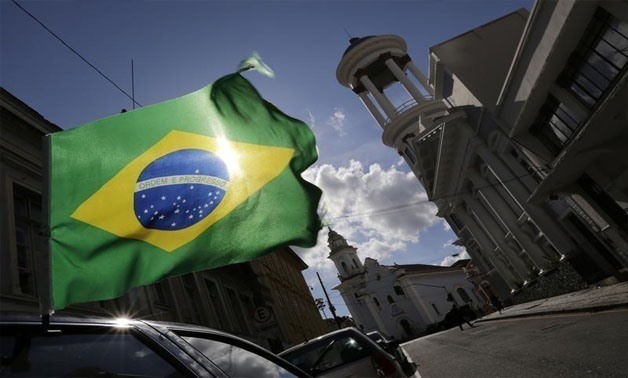
A Brazilian flag is seen over a car before the opening match between Brazil and Croatia at the 2014 World Cup, in Curitiba, June 12 2014 - REUTERS/Henry Romero
CAIRO - 24 January 2019: As Egypt has worked on pressuring the states that announced plans to move their embassies from Tel Aviv to Jerusalem, Egypt's Foreign Ministry denied on Wednesday alleged reports claiming that Brazil informed Egypt it cancelled its decision in this regard.
Egypt has exerted much obvious efforts to pave the way to the peace process between Israelis and Palestinians. However, states following the lead of US President Donald Trump's decision to move the US Embassy to Jerusalem, after he formally declared Jerusalem as Israel's capital, have apparently obstructed these efforts.
Since Brazil’s President-elect Jair Bolsonaro revealed in November his intention to move the embassy to Jerusalem, Egypt and the Arab League have worked on convincing the state to withdraw its decision.
Ahmed Aboul Gheit, head of the Arab League, said if the Brazilian Embassy move is approved, it will constitute a blatant and regrettable violation of international law and Security Council resolutions, which consider Jerusalem an occupied city and warn of a change in its status quo.
He also condemned that "a country that has a history of backing the United Nations, supporting the rights of oppressed peoples and rejecting hegemony and occupation would put itself in such a misguided position, which represents a blatant attack on international legitimacy."
The Arab League told Bolsonaro that moving the embassy to Jerusalem would be a setback for relations with Arab countries, according to a letter seen by Reuters earlier in December.
Brazil is considered the world's largest exporter of halal meat, as its exports of this meat amounts to over $5 billion annually, Reuters reported. Muslims consider the meat of cattle and poultry as halal (permissible) if only they are slaughtered according to the Islamic instructions.
Brazil exports meat worth $16 billion to the Middle East and Turkey per year, according to government statistics, while only 3 percent goes to Israel.
After his decision, Bolsonaro has come under intense pressure from Brazil's powerful agriculture sector, as it could hurt Brazilian exports to Arab nations, Reuters reported.
“The reaction will be given not only as an individual country but on behalf of the whole Muslim world,” a Turkish diplomatic source told Reuters on condition of anonymity. “We are expecting Brazil to act with reason and not confront the Muslim world.”
Cancelling Ferreira’s visit
Only two days after Bolsonaro's announcement in November, Egypt announced adjourning a visit by Brazil's top diplomat who was set to visit Egypt within three days.
Although Egypt’s Foreign Ministry postponed Aloysio Nunes Ferreira’s trip, citing problems with senior officials’ agendas, diplomatic sources said that the move was due to the president-elect’s vow to relocate the embassy, Reuters reported.
Ferreira was set to visit Egypt from November 8 to 11, 2018 to meet with President Abdel Fatah al-Sisi and Foreign Minister Shoukri.
Foreign Ministry sources, who requested anonymity due to the sensitivity of the issue, said no new date has been proposed, signaling Egypt’s discontent with Bolsonaro’s proposal, Reuters reported.
On May 14, the U.S. moved its embassy to Jerusalem in an opening ceremony, officially recognizing the city as the capital of Israel. Romania was among a few European Union (EU) countries that participated in the ceremony.
Only two days later, Guatemala moved its embassy to Jerusalem. Paraguay also opened its embassy in a West Jerusalem building in the presence of the country’s president.
Following U.S. President Trump’s decision to move the state’s embassy to Jerusalem, the 193-member U.N. General Assembly agreed to hold a rare emergency special session in December at the request of Arab and Muslim countries.
The UNGA met to vote on a resolution calling on the U.S. to drop its recognition of Jerusalem as Israel’s capital. A day before the vote, Trump threatened to cut off financial aid to countries that vote in favor of the draft resolution.
"They take hundreds of millions of dollars and even billions of dollars, and then they vote against us. Well, we're watching those votes. Let them vote against us. We'll save a lot. We don't care," Trump told reporters at the White House.
However, 128 countries voted for the resolution, while nine countries voted against, 35 abstained and 21 did not cast a vote.
Guatemala, Honduras, Marshall Islands, Micronesia, Nauru, Palau and Togo voted against the resolution, while Paraguay, Romania and Hungary abstained from voting.


Comments
Leave a Comment